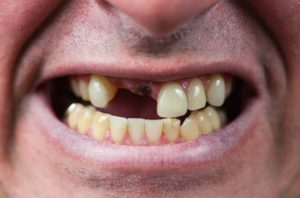Gum disease, tooth decay, injury, or a genetic condition can all be behind a missing tooth.
Regardless of the underlying cause for missing teeth, if you’re looking to replace a lost tooth or make adjustments to the overall appearance of your mouth, there are different treatments available.
Here’s a look at a few options to replace missing teeth, as well as the pros and cons of each option and cost information.
Dental implants
Dental implants are an option when you need to replace a single tooth, or when you’re missing several teeth in different areas of your mouth.
This treatment involves surgically mounting a titanium metal post or frame into your upper or lower jaw. A replacement tooth is then mounted to the implant, which allows the tooth to remain in place.
Basically, a dental implant provides a permanent base for a replacement tooth.
Advantages of dental implants
The biggest advantage is that the replacement tooth resembles a natural tooth and can last for decades.
Another advantage of an implant is that nearby teeth aren’t involved (like with a bridge), so the rest of your teeth should remain intact.
Disadvantages of dental implants
This is a surgical procedure, so you’ll need to be in good physical health for surgery and recovery. Plus, the healing process can take several months.
Your dentist won’t attach the replacement tooth until the dental implant completely heals.
Also, dental implants tend to be more expensive than other replacement options for a missing tooth. The procedure may be covered by some insurances, but you might be responsible for deductibles and co-pays.
What’s the impact of missing teeth?
In some cases, there may be little-to-no impact. Depending on the location of a missing tooth, you may not really notice a gap in your mouth. This might be the case if you’re missing a tooth in the back or side of your mouth.
But your teeth are designed to work together, so missing one or more teeth can sometimes impact speech, eating, and over time cause other problems.
If it becomes harder or uncomfortable to chew your food, it may lead to only eating on one side of your mouth or having to eat at a much slower pace. This can affect your jaw and facial muscles.
Missing teeth can change the shape of your face, as it can cause your mouth to shift.
Also, your bite might change to make up or compensate for lost teeth, and the remaining teeth may shift and move given the extra room. This can cause other issues such as tooth sensitivity, tooth grinding, and difficulty chewing.
The takeaway
Whether you’re missing teeth because of tooth decay, gum disease, or an injury, talk to a dentist about options for replacing a missing tooth.
The cost will vary depending on the replacement option, the number of teeth you need to replace, and even your location.
Some health insurances may cover the replacement cost, or at least some of it. If not, some dental offices offer payment or financing plans.
These treatment options are effective, and in most cases, a dental implant, bridge, or partial denture will last for years or even decades with regular brushing and care.

